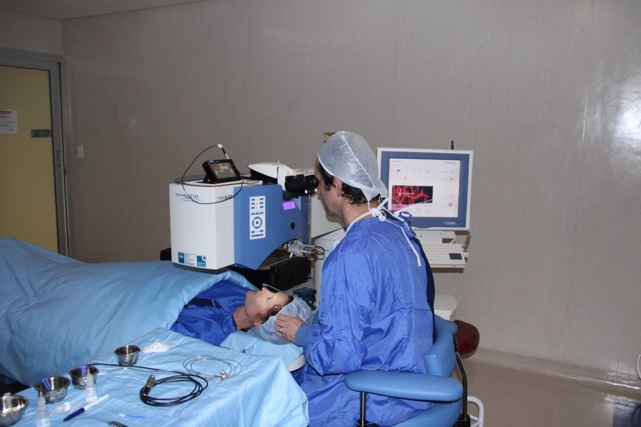Cataract Eye Surgery in Johannesburg, South Africa
What are Cataracts?

Cataracts are the leading cause of blindness worldwide and a common cause of vision loss in older patients. A cataract occurs when the eye’s lens becomes clouded and causes impaired vision. Though the precise cause of cataracts is unknown, most are associated with aging. Diabetes, family history, eye injuries, past eye surgeries, long-term exposure to UV or infrared light, and certain medications are also considered risk factors.
What are the Symptoms of Cataracts?
The symptoms and most common signs to look out for are:
- Clouded or blurry vision
- Noticeably clouded and hazy pupils
- Increased difficulty seeing in the dark or low light areas; the need for brighter lighting for daily activities.
- Increased sensitivity to light
- Light “halos” or glare
- Constantly changing prescription glasses/contact lenses.
- Vision has a yellowish tint
- Double vision
At first, the cataract may be so small that some of the symptoms of blurred and affected vision could go unnoticed. As it grows larger and spreads, the symptoms become more noticeable and should be addressed by an eye expert as soon as possible.
Types of Cataracts
There are three different types of cataracts: nuclear, subcapsular and cortical. The nuclear type gradually affects the entire lens from deep within the nucleus and is associated with aging. The subcapsular type is more common in younger patients and progresses at a faster rate. The cortical cataract creates white, cloudy areas that start on the edge of the lens and move to the center in a striped pattern. This type of cataract affects the lens cortex that surrounds the eye’s central nucleus.
Cataract Treatment in Johannesburg
Cataract surgery is the only treatment to fully correct this condition. A refractive test will be performed by our doctors, to evaluate the amount of nearsightedness, farsightedness, and astigmatism you have before surgery. Other measurements of your eyes will be taken to calculate the curvature of your cornea and the length of your eye. During surgery, the affected lens is removed and replaced with an intraocular lens implant (IOL). Our doctors offers premium IOLs that require little to no maintenance once implanted. Cataract surgery usually takes about 15 minutes and is an outpatient procedure.
How long is the recovery?
You will be able to go home after your cataract surgery in Johannesburg, but you will not be able to drive yourself. Our doctors will prescribe medicated eye drops and special post-operative sunglasses to protect your eyes during the healing process. You will also be given an eye shield to wear while sleeping or napping for at least seven days after surgery. Strenuous activity such as heavy exercise must be avoided after your procedure. Most patients experience blurred vision for a few days after surgery, but your vision will continually improve as you recover.
When should I consider cataract surgery?
Cataracts are often discovered during the course of a routine examination by an eye doctor. Early in the process of cataract formation patients can experience cloudy vision, double vision or trouble seeing in general. Luckily, for patients who have spotted a cataract, they can have it removed during its early stage. If the cataract reaches a more advanced stage it still can be removed through surgery. Patients who have been diagnosed with cataracts can seek treatment immediately and improve their vision.
Why Choose JHB Vision Clinic for Cataract Surgery?
Our doctors at JHB vision offer the most advanced and effective cataract treatments to their patients from around the world. Most cataract patients seeking improved vision are able to achieve their vision goals through cataract surgery.
Schedule an Appointment Today
Patients who have not been diagnosed with cataracts can consider our doctors’ Johannesburg LASIK procedures for vision enhancement. He also treats glaucoma, which, if allowed to progress, can lead to permanent vision loss. To learn more about all of your vision correction options or to schedule a consultation in Johannesburg, South Africa, contact our practice today at 011-214-9075.

